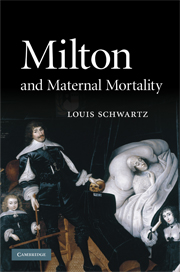Book contents
- Frontmatter
- Contents
- Acknowledgments
- Abbreviations
- Introduction
- PART I BEHIND THE VEIL: CHILDBIRTH AND THE NATURE OF OBSTETRIC ANXIETY IN EARLY MODERN ENGLAND
- PART II “SCARCE-WELL-LIGHTED FLAME”: THE REPRESENTATION OF MATERNAL MORTALITY IN MILTON'S EARLY POETRY
- 4 “Too much conceaving”: Milton's “On Shakespear”
- 5 “Tears of perfect moan”: Milton and the Marchioness of Winchester
- 6 “Farr above in spangled sheen”: A Mask and its Epilogue
- PART III “CONSCIOUS TERROURS”: THE PROBLEM OF MATERNAL MORTALITY IN MILTON'S LATER POETRY
- Index
- References
6 - “Farr above in spangled sheen”: A Mask and its Epilogue
Published online by Cambridge University Press: 04 December 2009
- Frontmatter
- Contents
- Acknowledgments
- Abbreviations
- Introduction
- PART I BEHIND THE VEIL: CHILDBIRTH AND THE NATURE OF OBSTETRIC ANXIETY IN EARLY MODERN ENGLAND
- PART II “SCARCE-WELL-LIGHTED FLAME”: THE REPRESENTATION OF MATERNAL MORTALITY IN MILTON'S EARLY POETRY
- 4 “Too much conceaving”: Milton's “On Shakespear”
- 5 “Tears of perfect moan”: Milton and the Marchioness of Winchester
- 6 “Farr above in spangled sheen”: A Mask and its Epilogue
- PART III “CONSCIOUS TERROURS”: THE PROBLEM OF MATERNAL MORTALITY IN MILTON'S LATER POETRY
- Index
- References
Summary
As the rest of this study argues, Milton never discarded his early interest in mortality, and later in life he found himself, for personal reasons, returning to his earlier thinking on the subject. There is therefore something chillingly prescient in the choices he made in constructing his early exercise in Jonsonian verse (though he need not have been a seer to understand his chances of seeing a wife die in childbirth). There is also something surprisingly sensitive and searching in these choices, and they, in part, laid the ground work for the even more remarkable poetry Milton would produce later as he meditated on his personal losses in the context of the Fall, and remembered, with perhaps no small temptation to bitterness, God's words to Eve in Genesis 3:16.
Milton's later approach to maternal mortality would be darker and less resolved than the one articulated in “An Epitaph on the Marchioness of Winchester” (hereafter “An Epitaph”), and it would be even more ambitious, attempting to dramatize irresolution itself while still giving voice to the promises of Christian consolation. Before we turn to that later poetry, however, one other important work requires some comment. A Mask, written just a few years after the epitaph for Jane Paulet, contains reproductive images that have not been adequately glossed. They are not all directly concerned with maternal mortality, yet several of them show that Milton had the figures of the mortal mother and of childbirth as a spiritual trial very much on his mind as he conceived his tale of a young woman's trial in the dark woods along the Welsh border.
- Type
- Chapter
- Information
- Milton and Maternal Mortality , pp. 141 - 152Publisher: Cambridge University PressPrint publication year: 2009
References
- 1
- Cited by



